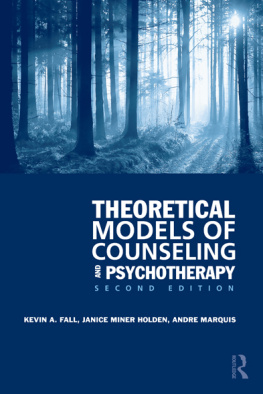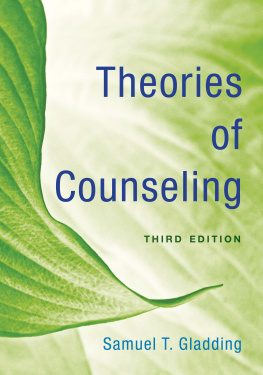THEORETICAL MODELS OF COUNSELING AND PSYCHOTHERAPY
SECOND EDITION
THEORETICAL MODELS OF COUNSELING AND PSYCHOTHERAPY
SECOND EDITION
KEVIN A. FALL, JANICE MINER HOLDEN, ANDRE MARQUIS

New York London
Routledge
Taylor & Francis Group
270 Madison Avenue
New York, NY 10016
Routledge
Taylor & Francis Group
27 Church Road
Hove, East Sussex BN3 2FA
2010 by Taylor and Francis Group, LLC
Routledge is an imprint of Taylor & Francis Group, an Informa business
This edition published in the Taylor & Francis e-Library, 2011.
To purchase your own copy of this or any of Taylor & Francis or Routledges collection of thousands of eBooks please go to www.eBookstore.tandf.co.uk.
ISBN 0-203-88612-7 Master e-book ISBN
International Standard Book Number: 978-0-415-99476-7 (Hardback)
For permission to photocopy or use material electronically from this work, please access www.copyright.com (http://www.copyright.com/) or contact the Copyright Clearance Center, Inc. (CCC), 222 Rosewood Drive, Danvers, MA 01923, 978-750-8400. CCC is a not-for-profit organization that provides licenses and registration for a variety of users. For organizations that have been granted a photocopy license by the CCC, a separate system of payment has been arranged.
Trademark Notice: Product or corporate names may be trademarks or registered trademarks, and are used only for identification and explanation without intent to infringe.
Library of Congress Cataloging-in-Publication Data
Fall, Kevin A.
Theoretical models of counseling and psychotherapy / Kevin A. Fall, Janice Miner Holden, and
Andre Marquis. -- 2nd ed.
p. cm.
Includes bibliographical references and index.
ISBN 978-0-415-99476-7 (hardcover : alk. paper)
1. Counseling. 2. Psychotherapy. I. Holden, Janice Miner. II. Marquis, Andre, Ph. D. III. Title.
BF636.6.F35 2010
158.3--dc22 2009033904
Visit the Taylor & Francis Web site athttp://www.taylorandfrancis.com
and the Routledge Web site athttp://www.routledgementalhealth.com
Contents
Preface
I (Kevin A. Fall) am writing the preface of this new version of Theoretical Models of Counseling and Psychotherapy in the same manner as I wrote the preface to the original: at the end of the writing process. Upon reflection, I am not sure why I choose to write the preface at the end. I even remember thinking about doing things a little different with this edition. I recall that I considered writing the preface at the beginning of the process, as a way to motivate myself and perhaps my coauthors to plow into the project ahead of us. I did not write it at that point. Change is difficult.
Change. That one word really sums up the core theme of this book. In fact, it characterizes the change in content as well as the process of revising the book. We were actually pretty satisfied with the first edition of the book. I have to admit, I was a bit reluctant to go back and revise itas if doing so was an admission of lack of quality. Each author spent some time with the material and, in our own ways, we made peace with adapting and evolving the book. In some ways and at some times, each of us felt excited and motivated. At other times the process seemed a bit overwhelming and even boring. I cannot help but believe that this is how our clients feel at times. One of the most fascinating elements of revising the book was to observe the parallel process of change as it relates to books and counseling. What seems apparent to me, now more than ever, is that learning about theory is the most important step in learning about change. We hope you keep this idea in mind as you read about the various approaches covered in this edition.
Obviously, because this is a revised edition, you are expecting change. We are pleased to offer the following to you in the spirit of change:
We updated each chapter for content, references, and resources. In come chapters, we dramatically revised and improved the material to deepen readers understanding of the theory.
We added a new chapter on Constructivist approaches. We thought this was an important addition to the text and a theory about which many of our students were interested in learning more. In our survey of other texts, we noticed that many covered only Solution-focused, Narrative, or a combination of the two. We have chosen to be a bit daring and cover Solution-focused, Narrative, and Mahoneys contribution to the field. We hope you enjoy this new chapter!
An authorship teamDe La Garza, Holden, Kantor, and Marquishas developed a Teachers Manual as an adjunct resource. This material provides a valuable supplement for theory course instructors to use in expanding student learning opportunities.
With any change process, modifications may be made but some of the original remains. Along with the updates and improvements, the core of this book is intact as is our commitment to provide you with a text that makes theory accessible and practical without sacrificing any of the depth inherent in each approach. If you are new to this text, by way of an orientation on how to use this book, the following is taken from the first edition:
Most of you are probably using this book as a required text in a graduate course on theory. We have been there, so we know that theory texts can seem abstract and distant, which can lead to your putting the book back on your shelf to collect dust until your comprehensive or licensure exams. We hope you use this book as a resource in your personal development as a mental health professional. We purposefully did not include a comparison chapter because we want you to compare and contrast the theories on your own. Explore! Get personally involved in the theories! The book is designed for you to literally work your way through the personal theory development process by reading the chapters, flipping back and forth and comparing sections, and using your class time to discuss the deeper aspects of the theory.
Very seldom are changes facilitated in isolation. Most changes occur through effort on the part of the individual with aid and support from others. We could not have completed this project without the help of several key people. First, we want to thank Fred Coppersmith for his patience and gentle encouragement on this revision. We also send our gratitude to our reviewers. Thank you, also, to Gail Kerrigan for applying her considerable graphic art talent in designing some of the figures in the book.
As I write this paragraph, I am aware that what ends a process for me, begins a process for you. Jan, Andre, and I wish you well as you learn about the process of change and hope you take the time to challenge yourself in the same way that you will learn to challenge your clients. Best wishes in your learning!
Kevin A. Fall
Janice M. Holden
Andre Marquis
Authors
Kevin A. Fall, PhD, is an associate professor in the Professional Counseling program at Texas State University. He worked for 11 years as a faculty member and served as Chair of the Department of Counseling at Loyola UniversityNew Orleans. He has coauthored several textbooks including Group Counseling: Concepts and Procedures with Robert Berg and Garry Landreth (Routledge, 2006), Translating Theory into Practice








